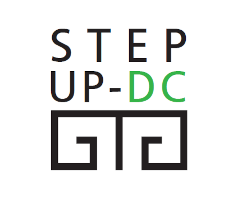Session 1, The political and social dimensions of formal education. Ideology, hidden curricula and the education of the citizen.
STEPUP-DC Project

Course DescriptionBasic Topics
- Functionalist and Neo-Marxist view of Education
- Hidden Curriculum
- Education as a Human Right
- Education as public service
Duration
The duration of the session is 9 hours (3 reading + 3 learning + 3 working/practicing)
Objectives
- Support learners in developing confident understanding of key concepts and theoretical debates on the socio-political role of education.
- Develop learners’ critical understanding of the political role of the curriculum and familiarise them with the concept and function of the hidden curriculum.
- Introduce the concept of the education of the citizen as integral part of education.
Learning outcomes
The completion of the session will allow student to:
- Have developed competent, critical understanding of the role of education not just as transfer of knowledge and skills but as a socio-political process which cultivates attitudes and promotes values.
- Have a critical understanding of the arguments about the tole of value-laden, overt and hidden processes in formal education.
- Be able to describe the basic argumentation about the role of education from a functionalist and from a Neo-Marxist perspective.
- Engage in critical conversations about the possibilities of formal education to operate as a liberating, emancipatory process.
Outcomes and CDC
- Knowledge and critical understanding
- 1805: Can reflect critically on his/her own values and beliefs (intermediate)
- 2001: Can explain the meaning of basic political concepts, including democracy, freedom, citizenship, rights and responsibilities (basic)
- 2029: Can reflect critically on how power structures and discriminatory practices within cultural groups operate to restrict opportunities for disempowered group members (advanced)
- 2047: Can explain what propaganda is (advanced)
- 2049: Can reflect critically on how histories are often presented and taught from an ethnocentric point of view (advanced)
- Values
- Valuing democracy, justice, fairness, equality and the rule of law
- 12: Argues that schools should teach students about democracy and how to act as a democratic citizen (intermediate)
- Attitudes
- Respect
- 501: Gives space to others to express themselves (basic)
- Civic-mindedness
- 601: Expresses a willingness to co-operate and work with others (basic)
- Skills
- Co-operation skills
- 1601: Builds positive relationships with other people in a group (basic/intermediate)
- 1607: When working as a member of a group, shows appreciation of and consideration for other group members (basic/intermediate)
- Functionalist and Neo-Marxist view of Education
- Hidden Curriculum
- Education as a Human Right
- Education as public service
The duration of the session is 9 hours (3 reading + 3 learning + 3 working/practicing)
- Support learners in developing confident understanding of key concepts and theoretical debates on the socio-political role of education.
- Develop learners’ critical understanding of the political role of the curriculum and familiarise them with the concept and function of the hidden curriculum.
- Introduce the concept of the education of the citizen as integral part of education.
The completion of the session will allow student to:
- Have developed competent, critical understanding of the role of education not just as transfer of knowledge and skills but as a socio-political process which cultivates attitudes and promotes values.
- Have a critical understanding of the arguments about the tole of value-laden, overt and hidden processes in formal education.
- Be able to describe the basic argumentation about the role of education from a functionalist and from a Neo-Marxist perspective.
- Engage in critical conversations about the possibilities of formal education to operate as a liberating, emancipatory process.
- Knowledge and critical understanding
- 1805: Can reflect critically on his/her own values and beliefs (intermediate)
- 2001: Can explain the meaning of basic political concepts, including democracy, freedom, citizenship, rights and responsibilities (basic)
- 2029: Can reflect critically on how power structures and discriminatory practices within cultural groups operate to restrict opportunities for disempowered group members (advanced)
- 2047: Can explain what propaganda is (advanced)
- 2049: Can reflect critically on how histories are often presented and taught from an ethnocentric point of view (advanced)
- Values
- Valuing democracy, justice, fairness, equality and the rule of law
- 12: Argues that schools should teach students about democracy and how to act as a democratic citizen (intermediate)
- Valuing democracy, justice, fairness, equality and the rule of law
- Attitudes
- Respect
- 501: Gives space to others to express themselves (basic)
- Civic-mindedness
- 601: Expresses a willingness to co-operate and work with others (basic)
- Respect
- Skills
- Co-operation skills
- 1601: Builds positive relationships with other people in a group (basic/intermediate)
- 1607: When working as a member of a group, shows appreciation of and consideration for other group members (basic/intermediate)
- Co-operation skills
A series of resources that the student teacher must study in this session and a series of additional resources for further study.
A full paper and additional e-lessons on the topics of the session and additional interactive presentation of the materials, for the student teachers to study all the materials in a row.
A series of authentic, up to date and relevant activities with their accompanying materials, which deliver the intended learning outcomes of the session and are carried out face to face or E-learning with groups of student teachers.
Several types of questions to evaluate how much the student teachers have learned throughout the session (reading material, learning material and workshop).
